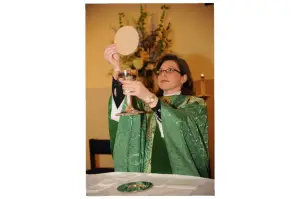Sacraments
A sacrament is an outward and physical sign of an inward and spiritual grace. Through sacraments, God meets us where we are, bringing love, compassion, and mercy. God’s grace meets us in countless, and often unexpected ways.
The sacraments of the Church are those rites in which God has promised always to meet us. The two primary sacraments of the Church are Baptism and Holy Communion. These sacraments are necessary for all Christians. The Book of Common Prayer also includes 5 other sacraments, offered as experiences of grace for individual lives. These are Confirmation, Marriage, Reconciliation of a Penitent, Unction, and Ordination.
Holy Baptism: The sacrament of Baptism is full initiation by water and the Holy Spirit into Christ’s Body in the church. The bond which God establishes in Baptism is indissoluble. Each candidate for Baptism is sponsored by one or more baptized persons.
Adults and the parents of infants and children seeking Baptism must attend a session during the week leading up to the event. For more information about baptism, please contact the church office.
 Holy Eucharist: Eucharist is a Greek term meaning “thanksgiving.” Holy Eucharist is the sacrament by which we express our deep thanksgiving for the life, death, and resurrection of Jesus Christ. At Holy Eucharist, the Communion of Christ’s body and blood is administered in bread and wine. In faith we say that Christ is present in these holy elements by the mystery of God. The grace imparted through Holy Eucharist is three-fold. It is backward-looking in blessed memory to the manifestation of God’s love on the cross. It is in the present moment for us a spiritual nourishment for our journey in faith. It is future-oriented as a foretaste of God’s heavenly banquet in which the creation will be made whole and all people will eat at the feast of the Lamb.
Holy Eucharist: Eucharist is a Greek term meaning “thanksgiving.” Holy Eucharist is the sacrament by which we express our deep thanksgiving for the life, death, and resurrection of Jesus Christ. At Holy Eucharist, the Communion of Christ’s body and blood is administered in bread and wine. In faith we say that Christ is present in these holy elements by the mystery of God. The grace imparted through Holy Eucharist is three-fold. It is backward-looking in blessed memory to the manifestation of God’s love on the cross. It is in the present moment for us a spiritual nourishment for our journey in faith. It is future-oriented as a foretaste of God’s heavenly banquet in which the creation will be made whole and all people will eat at the feast of the Lamb.
Confirmation: In the course of their Christian development, those baptized at an early age are expected, when they are ready and have been duly prepared, to make a mature, public affirmation of their faith and commitment to the responsibilities of their Baptism. At St. Margaret’s, Confirmation is offered on the Sunday of the Bishop's annual visitation. Candidates must attend a course in order to prepare for Confirmation. For more information on when the next class will occur, please contact the church office.
Holy Matrimony: Christian marriage is a solemn and public covenant between two people in the presence of God. In the Episcopal Church it is required that one of the parties be a baptized Christian. For more information about Weddings at St. Margaret’s, please contact the church office.
Reconciliation of a Penitent: God absolves our sin and frees us from sin’s burden whenever we ask for forgiveness with an authentically penitent heart and a conviction to amend our lives. Often, great comfort is found when God’s absolution is confidently pronounced to us by another faithful member of the Body of Christ. Reconciliation of a Penitent is the rite in which those who repent of their sins may confess them to God in the presence of a priest, and receive the assurance of pardon and the grace of absolution. Reconciliation is always available in the Episcopal Church. If you experience the need for this sacrament, please contact the Rev. Mary Vano.
Unction: Unction is the sacrament of healing whereby one who is ill is anointed with holy oil. In the case of illness or hospitalization, the church should be notified so a healing service can be performed.
Ordination: There are three orders of ordained ministry in the Episcopal Church: Bishops, Presbyters (or Priests) and Deacons. Bishops carry on the apostolic work of leading, supervising and uniting the Church. Presbyters share in the governance of the Church, in the carrying out of its missionary and pastoral work, and in the preaching of the Word of God and administering the holy Sacraments. The Deacon assists the Bishop and Priests with all of this work. It is also a special responsibility of Deacons to minister in Christ’s name to the poor, the sick, the suffering and the helpless.


